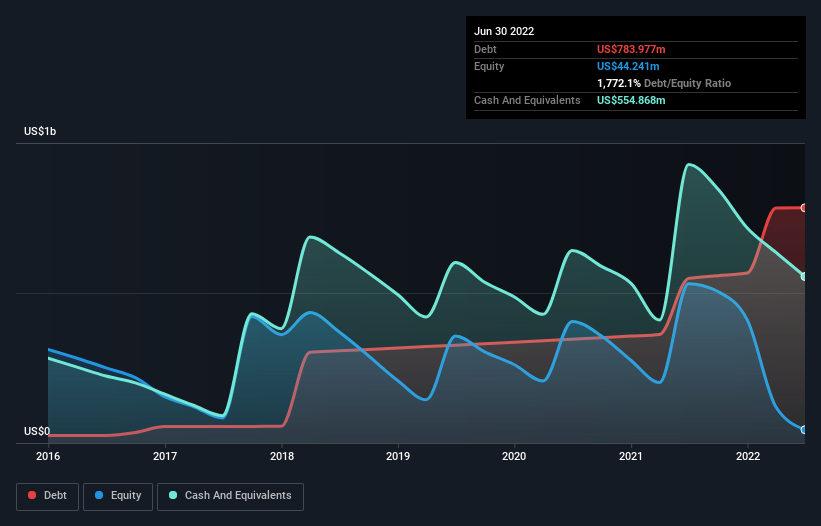
Legendary fund manager Li Lu (who Charlie Munger backed) once said, 'The biggest investment risk is not the volatility of prices, but whether you will suffer a permanent loss of capital.' So it might be obvious that you need to consider debt, when you think about how risky any given stock is, because too much debt can sink a company. We can see that Insmed Incorporated (NASDAQ:INSM) does use debt in its business. But the more important question is: how much risk is that debt creating?
When Is Debt Dangerous?
Debt and other liabilities become risky for a business when it cannot easily fulfill those obligations, either with free cash flow or by raising capital at an attractive price. Ultimately, if the company can't fulfill its legal obligations to repay debt, shareholders could walk away with nothing. However, a more frequent (but still costly) occurrence is where a company must issue shares at bargain-basement prices, permanently diluting shareholders, just to shore up its balance sheet. Of course, plenty of companies use debt to fund growth, without any negative consequences. The first step when considering a company's debt levels is to consider its cash and debt together.
See our latest analysis for Insmed
What Is Insmed's Debt?
You can click the graphic below for the historical numbers, but it shows that as of June 2022 Insmed had US$784.0m of debt, an increase on US$548.7m, over one year. However, because it has a cash reserve of US$554.9m, its net debt is less, at about US$229.1m.

A Look At Insmed's Liabilities
According to the last reported balance sheet, Insmed had liabilities of US$113.8m due within 12 months, and liabilities of US$895.3m due beyond 12 months. On the other hand, it had cash of US$554.9m and US$29.5m worth of receivables due within a year. So it has liabilities totalling US$424.8m more than its cash and near-term receivables, combined.
Given Insmed has a market capitalization of US$2.48b, it's hard to believe these liabilities pose much threat. However, we do think it is worth keeping an eye on its balance sheet strength, as it may change over time. When analysing debt levels, the balance sheet is the obvious place to start. But ultimately the future profitability of the business will decide if Insmed can strengthen its balance sheet over time. So if you want to see what the professionals think, you might find this free report on analyst profit forecasts to be interesting.
In the last year Insmed wasn't profitable at an EBIT level, but managed to grow its revenue by 30%, to US$221m. With any luck the company will be able to grow its way to profitability.
Caveat Emptor
While we can certainly appreciate Insmed's revenue growth, its earnings before interest and tax (EBIT) loss is not ideal. Indeed, it lost a very considerable US$397m at the EBIT level. Considering that alongside the liabilities mentioned above does not give us much confidence that company should be using so much debt. So we think its balance sheet is a little strained, though not beyond repair. However, it doesn't help that it burned through US$374m of cash over the last year. So in short it's a really risky stock. There's no doubt that we learn most about debt from the balance sheet. But ultimately, every company can contain risks that exist outside of the balance sheet. Be aware that Insmed is showing 2 warning signs in our investment analysis , you should know about...
Of course, if you're the type of investor who prefers buying stocks without the burden of debt, then don't hesitate to discover our exclusive list of net cash growth stocks, today.
New: AI Stock Screener & Alerts
Our new AI Stock Screener scans the market every day to uncover opportunities.
• Dividend Powerhouses (3%+ Yield)
• Undervalued Small Caps with Insider Buying
• High growth Tech and AI Companies
Or build your own from over 50 metrics.
Have feedback on this article? Concerned about the content? Get in touch with us directly. Alternatively, email editorial-team (at) simplywallst.com.
This article by Simply Wall St is general in nature. We provide commentary based on historical data and analyst forecasts only using an unbiased methodology and our articles are not intended to be financial advice. It does not constitute a recommendation to buy or sell any stock, and does not take account of your objectives, or your financial situation. We aim to bring you long-term focused analysis driven by fundamental data. Note that our analysis may not factor in the latest price-sensitive company announcements or qualitative material. Simply Wall St has no position in any stocks mentioned.
About NasdaqGS:INSM
Insmed
Develops and commercializes therapies for patients with serious and rare diseases in the United States, Europe, Japan, and internationally.
Excellent balance sheet and fair value.


